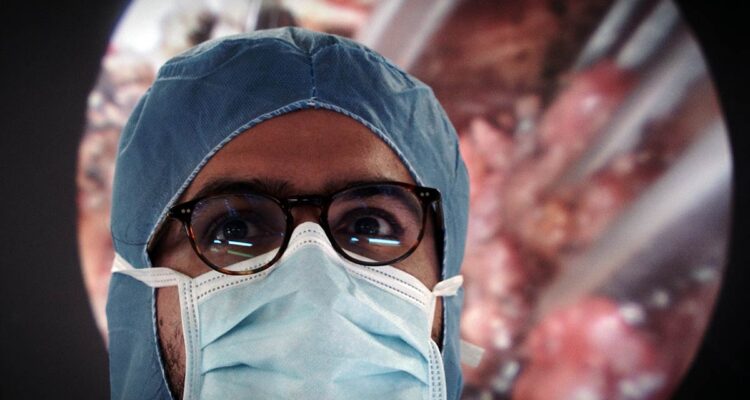Observed in isolation, detached from the body or in extreme close-ups, organs and other vital viscera resemble moist masses of soft tissue plucked from alien landscapes in the unflinchingly immersive medical documentary “De Humani Corporis Fabrica.” Alternating between footage from cameras inserted into patients for the purpose of treating ailments and grisly shots from the operating room, directors Verena Paravel and Lucien Castaing-Taylor, the team behind the striking non-fiction film on fishing “Leviathan,” apply their fascination for uncanny imagery with relativist intent to the inner workings of French hospitals and, in turn, the human body.
Voiceover of E.R. staff detailing some of the most heartbreaking cases they’ve witnessed introduces us to the culture around life and death that allows those in the medical field to perform their duties. The matter-of-factness rings insensitive but truthful to their experience.
READ MORE: Cannes Film Festival 2022 Preview: 25 Must-See Films To Watch
Doctors handle extirpated pieces of flesh without any emotional connotation to their provenance, speaking not about the person it belonged to but in descriptive terms about the ailment that caused the removal. Even when the exchanges are strictly clinical, as one would expect, that someone can compartmentalize the pain, physical and psychological, associated with the surgery complicates our feelings about mortality.
Soon, elderly patients with neurodegenerative diagnoses are introduced to illustrate, it seems, how certain bodily problems manifest in the mind. Though they appear disjointed from the more gut-churning segments in tone, these scenes tacitly expand the reach of the concept. These faces of disorientation give way to a trip inside a person’s intestines, a labyrinth of mucous matter, and then seamlessly transitions into an eye operation. On multiple instances, the filmmakers hide their cuts as if to create the illusion of an uninterrupted journey.
As with their other works, Paravel and Castaing-Taylor don’t draw a traditional narrative structure or include explanatory text. Their free association of images demands patience, even as some sequences go on interminably to the viewers’ dismay given their anatomical bluntness. The directing duo deals in the abstraction of their images, beautifully puzzling and confrontational at once. They zoom in, visually and thematically, so intently into a subject that the parts that comprise it acquire new meaning or enable us to see the whole differently.
With its uncompromising and full-frontal depiction of the elements that give us life, “De Humani Corporis Fabrica” tests our levels of comfort in accepting we are essentially all decaying entities made of organic material. It also makes us reconsider our relationship with medicine.

Take for example a scene centered on male genitalia where a doctor gripes about the ineptitude of his subordinates while he harshly inserts tubing into a man’s urethra. The member flops around and oozes blood to our disgust or shock. Yet, this is so utterly passé for the medic that he can concentrate on other preoccupations while his patient’s penis drains in the background.
Later, a birth by C-section may prove too graphic for some to endure. The miracle of life comes to fruition on screen not in angelical form, but as the bloody and violent occurrence that it is. There’s a large incision that rips through muscle and veins to release the newborn. As commonplace as we understand the procedure to be, the graphic nature of the images produces great uneasiness. That it comes from reality exacerbates this sentiment.
Sometimes it’s not the slashing of the flesh or internal cutting of membranes that unsettles, but one’s own realization of how vulnerable we become in the hands of people we’ve collectively granted permission to cure us. After all, they are still just people; gruelingly trained and capable, but still prone to err. Saving lives, high stakes as it is, remains only a job. A patient’s most devastating day is, for the most part, just another completed task for them.
When tensions flare in the operating room between medical professionals over minutia, while a person lies unconscious at their mercy, one can’t help but think about their position of power when we surrender to their presumed expertise. In truth, they are part of larger systems serving a pivotal purpose in society that’s almost too much to ask of anyone.
By following the staff into the bowels of the building, and in a sense into the mechanics of how things are run at medical facilities, the hospital is presented as a living organism itself or an organ with numerous unseen processes happening hidden from the public eye. Security guards walk underground tunnels ensuring there are no uninvited guest hiding there, just like the body fights infections or pathogens. Paravel and Castaing-Taylor, acting as their own cinematographer and editors, make choices like this that follow a uniquely cinematic logic.
At some point, “De Humani Corporis Fabrica” faces death head-on in the form of corpses in a room. Its engagement with the deceased and with the notion of the body as a machine that functions with precision until it inevitably breaks down departs both from the morbid exploitation of, say, the “Cannibal Holocaust” movies and the sugarcoated and family-friendly aim of something didactic like “Osmosis Jones.”
By the time it ends we haven’t learned much about human biology, but plenty about our perception of it and those that tend to it. The literal blood and guts of it all might present a barrier for some without the stomach to endure them, but when looking past it, what surfaces is a rigorously observational piece that’s as much about the insignificance of our existence, and a peculiar celebration of the reasons why it’s worthwhile staying alive. [A-]
Follow along with all our coverage from the 2022 Cannes Film Festival.

